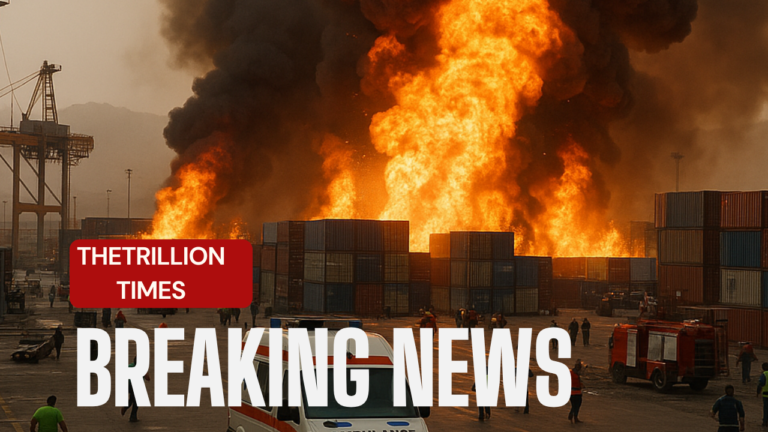Trump’s Blunt Warning to Israel Over Iran Strikes
In a dramatic turn of events, former U.S. President Donald Trump has openly criticized Israel for its recent military strikes on Iran, despite a U.S.-brokered ceasefire. His remarks, delivered both on Truth Social and during a NATO summit appearance in The Hague, were uncharacteristically stern and direct:
“Israel. Do not drop those bombs. If you do it, it is a major violation. Bring your pilots home, now!”
Trump’s strong message came as tensions between Israel and Iran flared again, threatening the fragile 12-day ceasefire initiated through backchannel diplomacy involving the U.S. and European partners.
Ceasefire Tested by Renewed Violence
Hours after the ceasefire was put in place, Iran launched a series of missile attacks, allegedly targeting military bases in northern Israel. In response, Israeli jets retaliated with airstrikes over strategic Iranian locations, including Tehran and Isfahan.
While Israel justified the action as defensive, Trump rebuked it as a direct violation of the agreement. In a White House press statement, he said:
“Israel unloaded right after we made the deal… they don’t know what the f*** they’re doing.”
This unexpected reversal from Trump, who has historically been a staunch supporter of Israeli military decisions, stunned both allies and adversaries alike.
“Bring Your Pilots Home”: Trump Reaffirms U.S. Peace Strategy
Trump’s call to halt Israeli airstrikes was part of a broader strategy to stabilize the Middle East through diplomacy rather than warfare. In another post on Truth Social, he declared:
“All planes will turn around and head home. Send a friendly ‘plane wave’ to Iran.”
This statement came shortly after U.S. defense officials confirmed that American forces were not involved in any new military action and were maintaining a defensive posture in the Gulf.
Trump reiterated that the ceasefire remains intact, stating:
“Israel is not going to attack Iran… Nobody will be hurt; the ceasefire is in effect!”
Global Response: Mixed Signals and Diplomatic Tightrope
World leaders responded cautiously. Russian Foreign Minister Sergey Lavrov welcomed Trump’s statement and urged both sides to adhere to the agreement. French President Emmanuel Macron and German Chancellor Olaf Scholz echoed similar sentiments, emphasizing the need for de-escalation.
Meanwhile, Israel’s Prime Minister Benjamin Netanyahu reportedly assured Trump that the air raids would be paused and the ceasefire respected.
In Iran, Supreme Leader Ayatollah Khamenei praised the country’s “strategic restraint” while remaining on high alert. Iranian state media claimed their military command expected a full-scale Israeli assault, only to be surprised by Trump’s sudden condemnation of the offensive.
Trump’s Role: Peacekeeper or Power Broker?
Trump’s public rebuke of Israel reflects a calculated shift from military escalation to diplomatic mediation. Just weeks ago, he warned Iran of “unconditional surrender” if it escalated its nuclear program. However, insiders suggest Trump prefers peace talks over a drawn-out regional war.
Aides say Trump told Netanyahu privately:
“Peace with strength is better than war with uncertainty.”
Despite this, U.S. warships like the USS Nimitz and USS Ford remain stationed in the region, signaling that deterrence remains part of the U.S. strategy.
Underlying Tensions: The Nuclear Question
The key issue remains Iran’s nuclear program. Intelligence reports claim Iran continues to enrich uranium, though it denies pursuing nuclear weapons. Trump emphasized that any Israeli or U.S. attack on Iranian nuclear sites could lead to uncontrolled escalation.
Diplomats from the International Atomic Energy Agency (IAEA) are pushing for renewed inspections. Meanwhile, talks in Vienna to revive the Iran Nuclear Deal (JCPOA) remain stalled.
Regional Fallout and Economic Ripples
Following Trump’s remarks and Israel’s compliance with the ceasefire, oil prices dropped by 4%, signaling market relief. Investors took this as a sign that broader regional conflict might be averted.
In neighboring countries:
- Jordan and Egypt called for restraint.
- Saudi Arabia maintained silence but activated military readiness near its Gulf coast.
- Lebanese militias, aligned with Iran, praised Tehran’s resilience but paused operations.
Biden, Democrats, and Global Perception
Although Trump is not currently in office, his influence on international diplomacy remains significant. The Biden administration has quietly supported Trump’s mediation efforts, seeing an opportunity to prevent further destabilization without committing ground forces.
Senate Democrats have issued mixed reactions:
- Some praised Trump’s ceasefire advocacy.
- Others warned about alienating Israel, a critical U.S. ally.
A recent Gallup poll shows 58% of Americans support diplomacy over military action in the Middle East.
The Bigger Picture: A Fragile Peace
While the current ceasefire holds, experts warn it is built on fragile ground. The cycle of provocation and retaliation between Iran and Israel remains unresolved. The broader geopolitical dynamics—including Iran’s ties with Russia and China, and Israel’s role in U.S. strategy—make the road ahead uncertain.
Final Thoughts: Defining a Legacy
Donald Trump’s powerful directive to “bring your pilots home” may be remembered as a defining moment in preventing a wider war in the Middle East. By publicly calling out one of America’s closest allies, he signaled that even longstanding partnerships must yield to peace.
Whether this gamble cements his image as a bold peace broker or costs him politically remains to be seen. But one thing is clear: the world is watching.

















+ There are no comments
Add yours